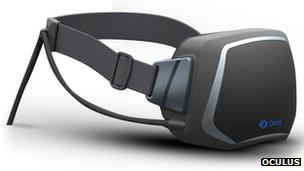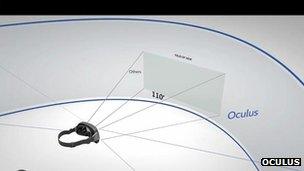Oculus Rift virtual reality headset gets Kickstarter cash
- Published

A concept design for the virtual reality headset has proved popular on crowdfunding site Kickstarter
A virtual reality headset supported by major video game developers is the latest tech project to cause excitement on the crowd-funding site Kickstarter.
Oculus Rift secured its target, external of $250,000 (£160,200) within its first four hours of going live.
The kit promises gamers an "immersive experience" using a 640 by 800 pixel screen for each of the user's eyes.
One VR expert noted that previous efforts to build a consumer-targeted device had disappointed.
But Palmer Luckey, the founder of California-based Oculus, said he believed his team had overcome the problems that had caused others to struggle.
"Most consumer-mounted displays have a diagonal field of view of about 30 to 40 degrees - you see a really small image way off in the distance and it doesn't make you feel like you are there," he said.
"With the Oculus Rift you get a diagonal field of view of 110 degrees. That means you're not looking at a screen any more - you actually feel like you are inside of the world."
Sony's HMZ-T1 personal 3D viewer, by contrast, offers similar resolution screens but only a 45-degree horizontal viewing angle. It launched last year and sells for £800.
Big beasts
Mr Luckey's efforts have already convinced some of the PC games industry's leading figures who agreed to appear in a promotional video. They include:
John Carmack, creator of the Doom series and co-founder of Id Software
Gabe Newell, chief executive of Valve, the firm behind Half Life and Portal
Cliff Bleszinski, design director at Epic Games, the maker of the Unreal Engine that powers Batman: Arkham City and a wide range of other titles
Mr Carmack announced in May that his firm was developing a version of Doom 3 which would be compatible with head-mounted displays.
He told The Verge tech site at the time that he finally felt that VR technology was getting to the point that it could be viable at a reasonable price point, external.

The developers say their kit has a much wider field of view than rival systems on the market
Oculus said it would bundle Doom 3 with early versions of its headset that it was offering to anyone who pledged $300 or more to its development costs.
Mr Carmack tweeted, external that the Oculus Rift was "a wonderful advance in VR kit" following the announcement, but stressed he had no formal ties to the project.
Tracking glitches
Others have doubts: Brain Blau used to carry out university research into virtual reality software and hardware before joining the tech consultancy Gartner.
He recalled that VR systems were popular in video arcades in the late 1980s and 1990s. He said the tech had gone on to win orders from the military and others who used it in training systems, but efforts to develop a consumer-orientated version had repeatedly failed.
"Head-mounted displays gives users a fully immersive experience," he told the BBC.
"But it can be very disconcerting as you're not used to seeing with part of your vision blocked and the tracking does not always perfectly match the visuals.

The developer kit is being bundled with a version of Doom 3 designed to work on headsets
"People have been trying for the past 15 years to make one that works well. Today's computing engines have advanced, so it's possible that this could work, but I'm sceptical as the other systems I've used have required a conscious effort to suspend your disbelief."
Oculus Rift acknowledged that other VR headsets had suffered latency problems - the issue of graphics not perfectly tracking the user's head movements - but added that it had managed to minimise the problem by using high-density light-weight screens and taking advantage of price drops in the cost of motion sensors.
The firm said it intended to deliver the first of its developer kits before the end of the year, but did not specify when a final product was expected to come to market.
- Published31 July 2012
- Published9 July 2012
- Published17 April 2012
- Published29 May 2012
- Published1 May 2012
- Published10 July 2012
- Published29 March 2012